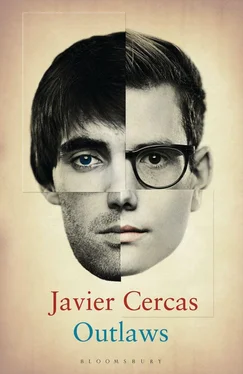‘No.’
‘Fear. Pure and simple fear. I couldn’t believe it, and the surprise made me swallow my pride, I shut up and sat back down at my desk. I waited for Zarco’s apology, which was not forthcoming; the only thing that reached me, in the silence of the visiting room, filtered by the glass that separated the two rows of bars, was his laboured and hoarse breathing. I stood up, stretched my legs, took a deep breath, sat back down at my desk and, after a pause, tried to get Zarco to see reason. I said that I understood but that this was not the moment to think of transfers, I assured him I’d speak to the superintendent as soon as I could and demand he put a stop to the guards’ persecution, I asked him to endure it for a little longer, I reminded him that he had within reach what he’d so long been fighting for, I begged him to calm down, not to ruin everything. Zarco listened to me with his head hanging, still furious, still panting a little, although when I finished speaking he seemed to have cooled off; he let a few seconds go by, hinted at a smile that almost seemed like an apology or that I interpreted as an apology, accepted that I might be right and finally asked me to talk to the superintendent as soon as I could so that the harassment of the guards would stop and accelerate as far as possible the granting of weekend passes and conditional release. I said yes to everything, promised that as soon as I left the interview room I would go to see the superintendent and, without any more explanations, we said goodbye.
‘I did what I’d promised. And approximately three weeks later Zarco enjoyed his first weekend pass in a long time.’
‘So do you think it was a blend of jealousy and fear that made Zarco lose his initial optimism, that worried and infuriated him?’
‘Yes. Although the fear was the fundamental thing.’
‘But fear of what?’
‘That took me even longer to understand. Do you know what it’s like to want something and be afraid of it at the same time?’
‘I think so.’
‘Well, that’s what was happening to Zarco: there was nothing he wanted more than to be free, and at the same time there was nothing he feared more than being free.’
‘Are you telling me that Zarco was afraid to get out of jail?’
‘Exactly.’
‘Was Gamallo afraid of leaving the prison? Of course he was! How couldn’t he be? Did Cañas tell you this? And when did he figure it out? Because if he’d figured it out in time, he would have been spared a lot of unpleasantness, and would have spared the rest of us too. And the thing is if you think it through it wasn’t that difficult, eh? Gamallo had been living in prisons for decades; prison life is bad, but over the years you start to master the rules and get used to it, and it can end up seeming like a comfortable life. That’s what happened to Gamallo, who actually didn’t know any other kind of life. For him prison was his home, while liberty was the outdoors: he’d forgotten what it was like out there, what was out there, how to behave out there, maybe even who he was out there.’
‘Cañas basically said that, in theory, there was nothing Zarco desired as much as getting out of jail, but deep down there was nothing he was so frightened of.’
‘He’s right: when he was far from freedom, Zarco did what he could to get closer to getting it, whereas, when he got too close to getting freed, he did whatever he could to get away from it. I think this explains in part what happened. When he came to the Gerona prison at the end of the year, Gamallo was quite a balanced inmate without much appetite for trouble, he rather seemed to want to go unnoticed, to join in with the rest of the inmates and to co-operate with us; four or five months later, when he became eligible to start applying for weekend passes, he’d turned into a gruff, rebellious and angry inmate who was confrontational with everyone and saw enemies everywhere. The prospect of freedom unhinged him. I insist that, if Cañas had understood all this in time, perhaps he wouldn’t have proceeded in the worst possible way, which is how he proceeded: trying to get Gamallo out of prison as soon as he could and by any means possible, instead of being prudent and letting time take its course and letting him mature and letting us prepare him for freedom (supposing we could have done so, of course); and, especially, running that disastrous press campaign that put Gamallo back on the front pages.’
‘Did you tell Cañas all this?’
‘Of course. As soon as I could. As soon as it was clear to me.’
‘When was that?’
‘The second time we saw each other in my office. On that occasion it was he who requested the meeting. Or rather who improvised it. That afternoon I was negotiating with a contractor who was going to carry out some work that we’d been needing to get done at the prison for some time when my secretary interrupted me to tell me that Cañas wanted to see me urgently. I told her it was going to be a while before I finished and to fix an appointment for the lawyer for any day that week, but my secretary answered that Cañas insisted on seeing me immediately and I agreed to let him come in. I cut short my dialogue with the contractor, but as soon as I saw Cañas walk into my office I realized I’d made a mistake and should have made him wait a little longer so he could calm down. I shook his hand and offered him a seat on the sofa, but he didn’t sit down, and we both stood there beside the redundant piece of furniture. The first thing Cañas said to me was that he’d just spoken to Gamallo and had come to present a protest, and the first thing I thought when I heard him was that I wasn’t surprised he’d come to present a protest in Gamallo’s name and that, although he was probably puffed up by the triumph of the media offensive he’d launched in favour of his client and by the political and popular support he’d won with it, Gamallo had managed to infect him with his recent nervousness. I thought of saying to him: For this you kicked up a fuss with my secretary? Although in the end I only said: Tell me.
‘Without further ado Cañas threw in my face the mistreatment to which, according to him, two guards were subjecting his client. He rounded off his complaint with the threat of bringing a lawsuit against my two subordinates, of talking to the director-general of prisons and of taking the case to the newspapers. Then he concluded, emphatically: Either you stop this or I do. Cañas pointed his index finger at me, his eyes wide open behind the lenses of his glasses; the gentlemanly and proud winner of his first visit had disappeared, and in his place was an irate, high and mighty señorito , panicking that he might lose. I stood staring at him in silence. He lowered his finger. Then I asked him the names of the two guards and Cañas told me: they were two of my most trusted men (one, head of service; the other a guard who’d been working under me for twenty years). I sighed and again offered him a seat, this time in front of my desk; the lawyer again refused, but I pretended he’d accepted and sat back down. Don’t worry, I said. I’ll open an investigation. I’ll speak to both guards. I’ll find out what has been going on. In any case, I added straight away, leaning back in my armchair and making it turn, let me be honest with you: I was expecting this. Cañas asked me, impatiently, what it was that I expected. I reflected for a moment, tried to explain: I assured him that for some time all my specialists had been noticing a physical and psychological backslide in Gamallo, that for a couple of weeks at that point Gamallo had been refusing the methadone treatment he was on to combat his heroin addiction (which could only mean he’d found a way to get drugs and was using them again), that his relationship with the guards and with the rest of the inmates was getting worse by the day and that the whole prison-management team felt that an important part of the blame for the mess fell on the uproar of the propaganda campaign in favour of a pardon and especially on the unexpected new life that this uproar had given to Zarco’s personality.
Читать дальше












